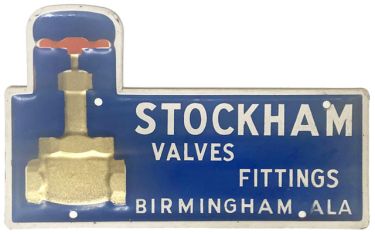Stockham Valves & Fittings
Stockham Valves & Fittings Inc., originally Stockham Pipe & Fittings Company, was a manufacturer of cast iron products, predominantly large valves and pipe fittings used in heavy industry and infrastructure.
The company was founded by William Stockham with five employees working out of a leased car barn in 1903. Products manufactured in Stockham's foundry included brake shoes, iron pipes, manhole covers, meter boxes, sash weights, and streetcar wheels.
In 1908 a fire damaged the company's pipe moulds and Stockham concentrated on its fittings business. A second fire in 1914 led Stockham to relocate to a new 106-acre site northeast of the intersection of 10th Avenue North and 40th Street North in what is now Birmingham's Kingston neighborhood.
The 176,300 square-foot factory was completed in 1918. The manufacturer grew rapidly in the 1920s, and along with upgrades to its production plant, also constructed warehouses in Chicago, Illinois; Los Angeles, California; and Houston, Texas.
William Stockham died in 1923. His son, Herbert took over as president of the company, but most decisions were made by his widow, Kate, who chaired the board of directors. In line with her progressive inclinations, Stockham adopted welfare capitalism strategies during that decade that helped it to retain skilled workers, including company-provided houses, medical benefits, and sponsorship of recreational programs, including a Stockham Male Chorus, a YMCA branch and an Industrial Leagues baseball team.
During the Great Depression the company also directly furnished workers food, coal and clothing. Though the company maintained racial segregation, opportunities for skilled Black workers were greater than at many other companies, and the children of Black workers had comparable access to company-funded scholarships.
In the 1930s Stockham added steel, bronze and brass fittings to its line of malleable and gray cast iron products and introduced pay scales based on productivity, which strained relationships with labor. During World War II the company produced 75mm tank and naval gun shells, as well as tank plating and grenade casings for the U.S. military. The plant was unionized in that period, with workers represented by United Steelworkers of America Local 3036.
After the war, Stockham replaced its gas-fired crucible furnaces with five new electric furnaces. After Kate Stockham's death in 1947 the company, which hadn't manufactured pipe since 1908, updated its name to Stockham Valves & Fittings. Herbert's younger brother Richard took over as president in 1953. USW 3036 organized a 9-week labor strike in 1959, winning hourly wage increases, more vacation bay, and fairer seniority rules.
Through the remainder of the 20th century the company grew as a supplier to the rapidly-growing petroleum industry and for the mechanization of agriculture and building systems. Richard Stockham was succeeded by his nephew Herbert Stockham Jr in 1975. In 1975 the company made 19,000 different products and was recognized as Birmingham's 3rd-largest private employer.
A verdict in a racial discrimination lawsuit brought by 3 Black workers resulted in a 1983 settlement in which the company agreed to pay $1.65 million to 5,600 black employees and former employees and their families.
By the 1990s Stockham Valves & Fittings was facing much stiffer competition from overseas manufacturers. The company responded by redesigning its products and processes to reduce waste, with help from engineers at the University of Alabama. Those efforts included several waves of lay-offs. In 1996 Stockham reported $116 million in revenues and employed about 1,200 people.
In the mid-1990s Stockham sold its pipe-fitting, pattern, and tooling operations to the Grinnell Corporation of Lansdale, Pennsylvania. In 1997 they sold the "Stockham Valve" name to the Crane Company of Stamford, Connecticut. Production in Birmingham ceased and the plant closed in 1998.
Bond Industries operated from the southern part of the Stockham Valves & Fittings site until 2015. In 2018 Coca-Cola Bottling Co. United acquired an 88-acre parcel at the former foundry site. In 2023 the bottler filed a voluntary cleanup plan for the site with the Alabama Brownfield Program.
References
- White, Marjorie Longenecker (1981) The Birmingham District: An Industrial History and Guide. Birmingham: Birmingham Historical Society ISBN 9990230099
- Lewis, W. David (1994) Sloss Furnaces and the Rise of the Birmingham District: An Industrial Epic. Tuscaloosa: University of Alabama Press. ISBN 0817307087
- McKiven, Henry M. (1995) Iron and Steel: Class, Race, and Community in Birmingham, Alabama, 1875-1920. Chapel Hill, North Carolina: University of North Carolina Press ISBN 0807845248
- Fair, John D. (March 27, 2023) "Stockham Valves and Fittings." Encyclopedia of Alabama - accessed December 8, 2023
- Rebman, Stephanie (December 8, 2023) "Former Stockham Valve site slated for cleanup to make way for company expansion." Birmingham Business Journal
External links
- Stockham Pipe & Fittings Company at the Historic American Engineering Record
